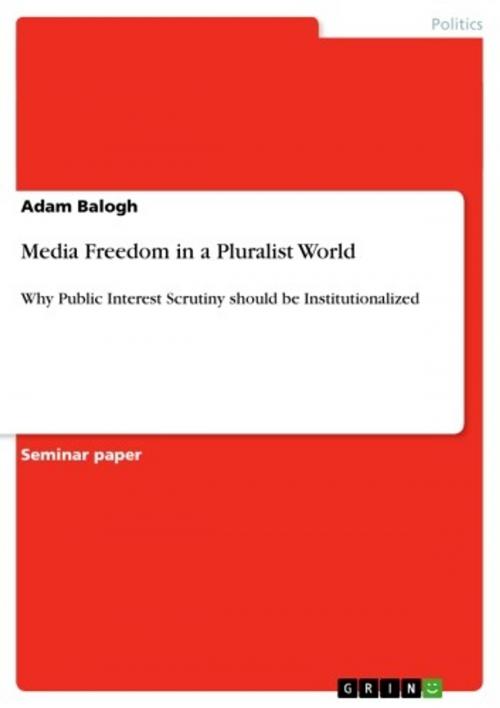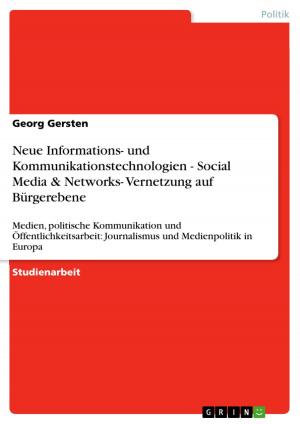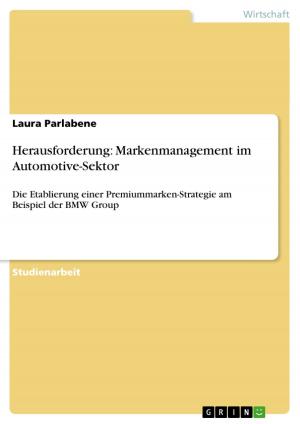Media Freedom in a Pluralist World
Why Public Interest Scrutiny should be Institutionalized
Nonfiction, Social & Cultural Studies, Political Science, Politics, History & Theory| Author: | Adam Balogh | ISBN: | 9783656371410 |
| Publisher: | GRIN Verlag | Publication: | February 12, 2013 |
| Imprint: | GRIN Verlag | Language: | English |
| Author: | Adam Balogh |
| ISBN: | 9783656371410 |
| Publisher: | GRIN Verlag |
| Publication: | February 12, 2013 |
| Imprint: | GRIN Verlag |
| Language: | English |
Seminar paper from the year 2012 in the subject Politics - Political Theory and the History of Ideas Journal, grade: A- bzw. 1,7, Central European University Budapest (Department of Public Policy), course: Media Freedom in a Pluralist World, language: English, abstract: Earlier this year, when a list of some 230 Nobel Peace Prize candidates was announced by the Oslo committee, for the first time in over a hundred years of the traditionalized execution of Alfred Nobel's will, a whistleblower has found his way on the said list: Bradley Manning (Welt 2012). Although the European Union has prominently, and somewhat controversially, received the award (Zeit 2012), the nomination of Manning highlighted the contemporary importance of the phenomenon of whistleblowing. Bradley Manning, a former U.S. Army soldier and intelligence analyst, was arrested in early 2010 on suspicions of having passed classified material on to the whistleblowing-hub Wikileaks (USD-C 2010). Among the documents, Manning is alleged to have leaked, are more than 250,000 U.S. diplomatic cables1 (Wikileaks 2011) and more than 500,000 U.S. Army reports2 (Wikileaks 2010), exposing them on the international stage leading to controversy about U.S. foreign policy and consequently their handling of whistleblowers. The extreme crackdown by U.S. authorities and the 'inhumane' conditions under which Manning was detained (Amnesty International 2011) were exemplary of the force the U.S. Government is willing to employ in order to strike down such misconduct and, perhaps, the greater degree of or different approach to legal protection that needs to be afforded to military and intelligence whistleblowers. Therefore, the purpose of this term paper is to show why military and intelligence whistleblowers need more legal protection and in particular why the so-called 'public interest scrutiny' should be institutionalized. This paper intends to deliver an answer to these questions in the following manner: The first part comprises a summary of the term 'whistleblowers' where it will be shown why the protection of whistleblowers is a fundamental element of media freedom in the 21st century. The second part entails a detailed description of the term 'public interest scrutiny' and its importance in relation to military and intelligence whistleblowers. The second part will address the questions posed in this paper, i.e. in particular why the 'public interest scrutiny' should be institutionalized. At last, the third part will bring forward policy recommendations on the basis of the findings in part one and two, including detailed suggestions about the possibility of institutionalizing 'public interest scrutiny'.
Seminar paper from the year 2012 in the subject Politics - Political Theory and the History of Ideas Journal, grade: A- bzw. 1,7, Central European University Budapest (Department of Public Policy), course: Media Freedom in a Pluralist World, language: English, abstract: Earlier this year, when a list of some 230 Nobel Peace Prize candidates was announced by the Oslo committee, for the first time in over a hundred years of the traditionalized execution of Alfred Nobel's will, a whistleblower has found his way on the said list: Bradley Manning (Welt 2012). Although the European Union has prominently, and somewhat controversially, received the award (Zeit 2012), the nomination of Manning highlighted the contemporary importance of the phenomenon of whistleblowing. Bradley Manning, a former U.S. Army soldier and intelligence analyst, was arrested in early 2010 on suspicions of having passed classified material on to the whistleblowing-hub Wikileaks (USD-C 2010). Among the documents, Manning is alleged to have leaked, are more than 250,000 U.S. diplomatic cables1 (Wikileaks 2011) and more than 500,000 U.S. Army reports2 (Wikileaks 2010), exposing them on the international stage leading to controversy about U.S. foreign policy and consequently their handling of whistleblowers. The extreme crackdown by U.S. authorities and the 'inhumane' conditions under which Manning was detained (Amnesty International 2011) were exemplary of the force the U.S. Government is willing to employ in order to strike down such misconduct and, perhaps, the greater degree of or different approach to legal protection that needs to be afforded to military and intelligence whistleblowers. Therefore, the purpose of this term paper is to show why military and intelligence whistleblowers need more legal protection and in particular why the so-called 'public interest scrutiny' should be institutionalized. This paper intends to deliver an answer to these questions in the following manner: The first part comprises a summary of the term 'whistleblowers' where it will be shown why the protection of whistleblowers is a fundamental element of media freedom in the 21st century. The second part entails a detailed description of the term 'public interest scrutiny' and its importance in relation to military and intelligence whistleblowers. The second part will address the questions posed in this paper, i.e. in particular why the 'public interest scrutiny' should be institutionalized. At last, the third part will bring forward policy recommendations on the basis of the findings in part one and two, including detailed suggestions about the possibility of institutionalizing 'public interest scrutiny'.















